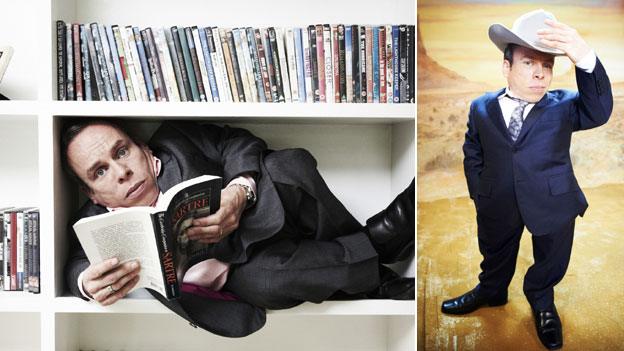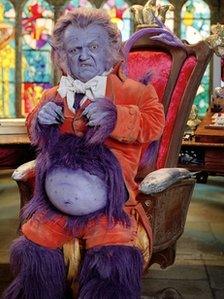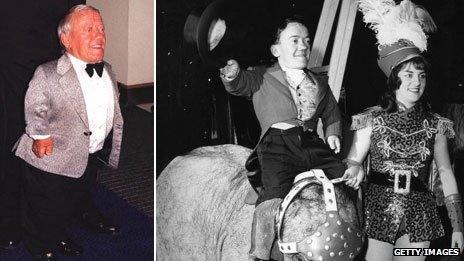The dwarf actor dilemma
- Published

This week sees the start of Ricky Gervais's new series Life's Too Short, a comedy about a dwarf acting agency and its self-important owner. In real life the star, played by Warwick Davis, really does run such an agency. But how easy is it to be an actor with restricted growth and keep your integrity intact when many of the available jobs are as woodland folk or magical panto characters?
When you think of dwarfs, or the preferred term "people with restricted growth", many of us think back to pantomimes like Snow White, classic musical The Wizard of Oz and the novel and film Lord of the Rings.
Next year sees a darker remake of Snow White starring Kristen Stewart, and at the end of 2012 the first of Peter Jackson's hotly anticipated Hobbit movies will reach the cinemas. Assuming they don't always opt for mini-CGI versions of actors, these films will be expected to keep short actors in employment, but casting short people in grittier real-life roles is a less regular occurrence.

Rusty Goffe starred in Stupid, a comedy sketch show for children
So should actors with restricted growth take the jobs that are there or shun them out of principle for fear of letting the side down?
Actress Kiruna Stamell, 29, is 3ft 6in tall and appears as Amy, Warwick Davis's love interest in three episodes of Life's Too Short. Her previous roles include parts in EastEnders, where she played a teacher, and also as La Petite Princess, a dancer in Baz Luhrmann's Moulin Rouge. So far at least, she has avoided playing elves or pixies.
Stamell says she respects people who play magical roles but worries that it's not necessarily positive for everybody.
"I feel that when some people go into that sort of work it's a result of having been exposed to a lack of aspiration. Not from the actors themselves but as a result of society's low expectations of short people."
Actors famously spend lots of time "resting" or waiting tables between jobs, but people of restricted growth can find difficulty getting ordinary work due to accessibility problems or prejudice.
Peter Burrows, co-owner of Davis's Willow Management dwarf acting agency, has a relaxed attitude to the range of roles on offer.
At 64, he recalls the difficulties of getting ordinary work when he was a young man.
"When I left school in the early 60s, I wanted to be an electrician but nobody took me on because it meant carrying an extra large pair of steps and they didn't have a bigger van to carry them in. They wouldn't get away with it now. So I had to come away."
The roles he and his fellow short actors have had the opportunity to play have brought experiences that most people would never get, including the chance to work in Hollywood.
"We have 250 short people on our books now," says Burrows. "Not all of them do it for money, they enjoy it. It's very uncomfortable wearing some of those costumes but a lot of people would give their right arm to be in Star Wars, Dark Crystal, Labyrinth and things like that."
He points out that actors get sent for auditions for everything from Shakespeare to TV baddies.
But many in the community believe the over-representation of dwarf actors in fantasy roles helps decrease respect and could even add to the attention they already get when walking down the street.
"It can be from eye-level staring to double takes," says Stamell. "From abusive comments to someone actually coming into my physical space."
Rusty Goffe has appeared in films such as Willy Wonka, Star Wars and Harry Potter. He has also been a pantomime dwarf for 45 years. He recognises that panto is usually a child's first theatre experience and, when they stare and point, he likes the opportunity to help them understand more about him.
"Children are curious." he says. "They say 'Look at that funny little man'. The next question is 'Why is he so small?'"
"I don't think people understand dwarfs. People don't realise it's a genetic condition and tend to mysticise us."
Dwarfism is a disability experienced by an estimated 6,000 people in the UK and can take many forms with many and varied symptoms.
The apparent fascination could stretch back into ancient folklore, says Prof Jack Zipes, a leading scholar of fairy-tale studies. But he says it has intensified.
"In the 1930s, two things happened to arouse fascination of people in the West," he says. "One is the Disney film in which the dwarfs are much more interesting than Snow White, they have distinct personalities, they're cute cuddly figures and they're still popular today.
"The second thing is Tolkien, who wrote The Hobbit and Lord of the Rings trilogy. Hobbits are quite obviously dwarfs and are intriguing characters with much more depth than Disney brought."
There are actors who have avoided playing fantasy dwarf roles. American actor Peter Dinklage is 4ft 5ins but has had a string of well-received performances. In his 2003 film The Station Agent, he played a man who moved to rural New Jersey to live a life of solitude after the death of his only friend.
His recent Emmy for his part in the glossy HBO fantasy series Game of Thrones gives some measure of his success, but his career path is not one that all dwarf actors would be able to follow.
And aside from the dilemma of stereotypical roles, dwarf actors are also in demand to fulfil demeaning roles, such as jumping out of cakes at parties.
Stamell sees this as sinister.
"It's the person being passive and quite often oppressed in some way like doing jobs such as wearing guacamole dips on their heads at a party, using them as a table. It's complete objectification."
"I'd say it's pretty soul destroying and purely exhibiting. But yes, you can make money from it."

Kenny Baker, who played R2D2, worked for a short time in a circus
Size and shape alone doesn't make a career in acting, though. Theatre stalwart Goffe points to the importance of talent.
"When you perform in a panto, it gives you the opportunity to show the audience that you're not just an accident of birth but that you can sing, dance and make people laugh ... and not just by falling on your head.
"It's changed a lot now though. Going back when I first started in showbiz I used to go for auditions and they all thought that we came straight out of a circus and that I must be an acrobat.
"They wanted me to go flip flap flip flap. They thought: what's the good of being a dwarf if you can't go flip flap."